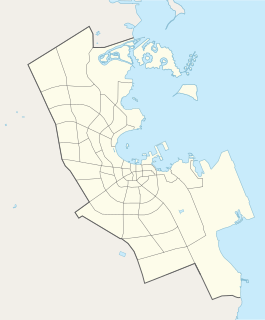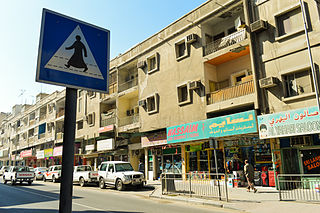Al Maadeed also spelled Al Maadid or Al Maadhid, is one of the primary tribes in Qatar.

A'ali is one of the biggest towns in Bahrain. It was part of the municipality of Mintaqah although from 2001 to 2014 it lay within the Central Governorate. It is a part of the Northern Governorate. A'ali is famous for its ancient burial mounds, especially several very large burial mounds in the city centre. A'ali is also famous for its traditional handcrafted pottery, which can be seen and bought from different potters and boutiques in the town.

Zinj is a suburb in the city of Manama, Bahrain.

Bilad al-Qadeem is a suburb of Manama in Bahrain.

Nuaija is a district in Qatar, located in the municipality of Ad Dawhah.

Mushayrib is a district in Qatar, located in the municipality of Ad Dawhah. As of the 2010 census, the former district of Al Asmakh has been integrated into Mushayrib.
Al Qa`abiyah is a settlement in Qatar, located in the municipality of Ash Shamal. It is located 8 miles south-east of the city of Ar Ru'ays and is 7 miles from the coast. J.G. Lorimer mentioned Al Qa`abiyah in 1908 in his Gazetteer of the Persian Gulf, remarking on the presence of a masonry well yielding good water.
Al Buainain is a clan of Bani Tamim tribe, and the clan is divided to three main branches which are al-Muhammad and al-Ali. The clan is based primarily in Eastern Province of Saudi Arabia, Qatar, United Arab Emirates and Bahrain. The tribe used to be involved in the lucrative pearl diving industry.
The Al Muhannadi also spelled as Al-Mohannadi tribe is an Arab tribal confederation of bedouin origins, based primarily in the Arab states of the Persian Gulf, especially in Qatar. Being a tribal confederation that emerged in the coastal town of Al Khor, the larger portion of its members belong to the Bani Hajer tribe. It is also known as Al Mahanda. The leading family of the tribe is the Al Misned family.

Bani Jamra is a village in the north-west of Bahrain. It lies west of the capital Manama, east of the coastal village of Budaiya. It is administered under the Northern Governorate.

Agriculture in Qatar is inherently limited in scope due to the harsh climate and lack of arable land. In spite of this, small-scale farming, nomadic herding, and fishing were the predominant means of subsistence in the region prior to the 20th century. Sea-based activities such as pearling and fishing served as the primary sources of income for Qataris until the commencement of oil drilling in 1939.

Al Markhiya is a neighborhood of Doha, Qatar. It is one of the later-developed areas of northern Doha. The district hosts three awsaq al-furjan complexes, which are part of a development project by the government to host all commercial establishments in centralized areas.
Seqaya is a suburb located in the Kingdom of Bahrain. It used to be a village separate from the capital Manama, but rapid urbanization of the city engulfed the village. It is predominantly a residential area and lies close to Salmaniya.

Janabiyah (Arabic:الجنبية) is a village situated in the north-west of Bahrain, close to the Gulf of Bahrain. It is located south of Bani Jamra and to the west of the village of Saar. It is under the Northern Governorate administrative region of the country. The village is mainly popular for its camel farms that host around 100 camels.

Sanabis is a village located in the Kingdom of Bahrain, in the suburbs of the capital city, Manama.
Al Mukaynis is a locality of Mebaireek located in the municipality of Ar Rayyan, Qatar. Mudhlem Cave, which translates to "Dark Cave" in Arabic, is located in the area. Nearby Al Rekayya Farms is a popular bird watching site.

Al Sakhama is a village in Qatar, located in the municipality of Al Daayen. It is situated near the border with Umm Salal Municipality.

Al Luqta is a district of Al Rayyan City in Qatar, located in the municipality of Al Rayyan.

Umm Al Houl is a district in Qatar located in the municipality of Al Wakrah. To the north of Umm Al Houl is the city of Al Wakrah while Mesaieed is to the south.

Tenbek is a village in Qatar located in the municipality of Al Daayen.












